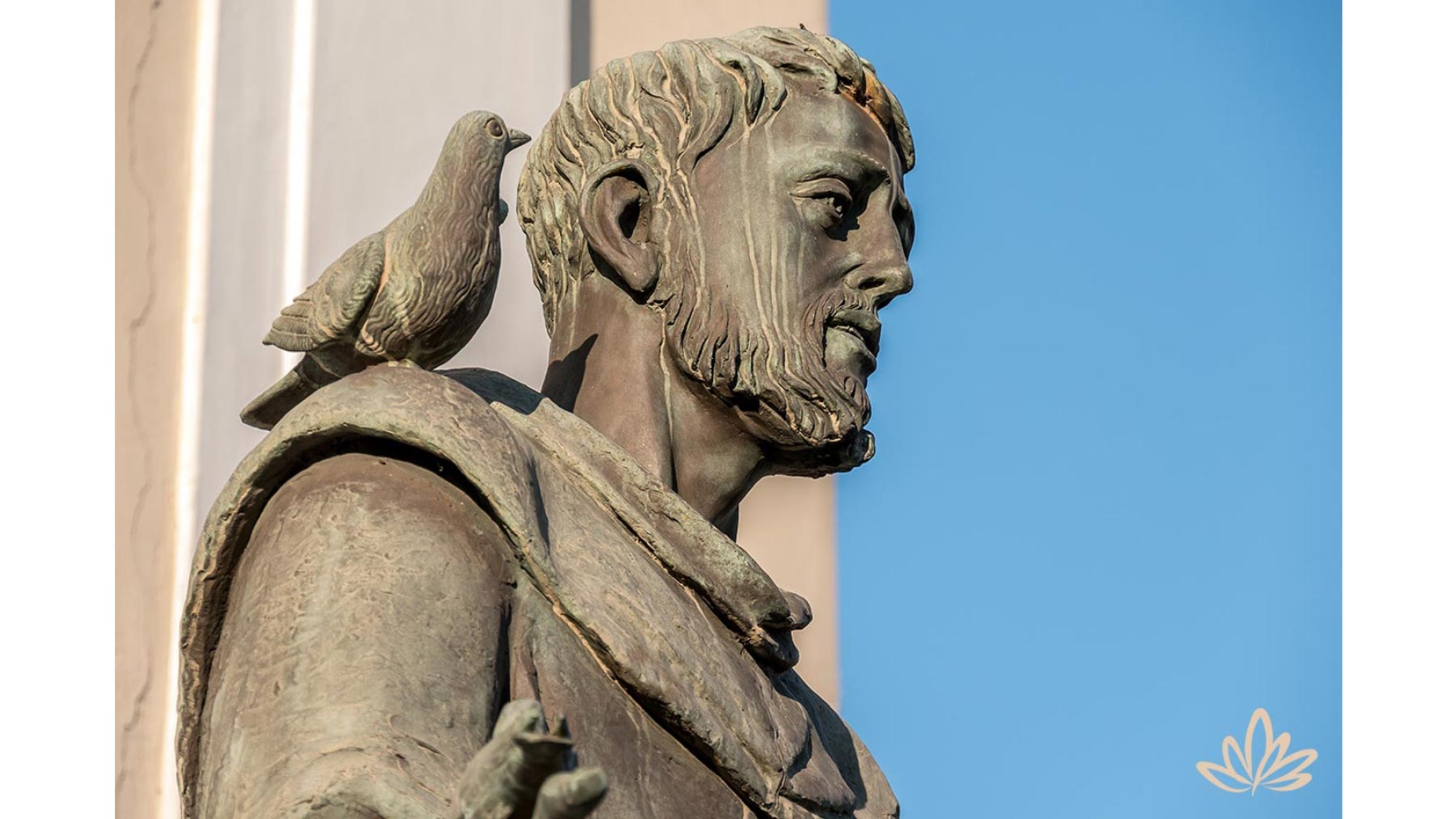The Journey of Francis of Assisi
From Rich Spoiled Brat to Patron Saint of the Environment and Animals
‘At the break of the day, Francis, with his reformed inner self, desired only to conform to the will of God’.
Unless someone or something intervenes, a great many people born with a silver spoon in their mouth grow up pretty much as expected. Isolated from the day-to-day grinding necessity of mere survival, it is nearly impossible for them to understand what life is like for the rest of us.
And long before transatlantic flights, TV, or the internet, brought the world and its variety of delights and despairs into our awareness, most people weren’t even aware of other people’s living conditions. From their isolated communities and perspectives, what they saw in their limited environments is pretty much what they expected to see everywhere else in the world, should they venture into the hinterlands beyond their little village or town.
Francis, born in Assisi, Italy in (or around) 1181, began life as a privileged rich kid. His father was both a landowner and a wealthy cloth merchant, so Francis was never in want as a child. Quite to the contrary! He was drinking fine wine, eating the best food, and partying hearty in every conceivable way from a young age. He left school before he turned 14, a rebellious tweener who drank himself into stupors while breaking city curfews. In fact, he was widely recognized during his youth for his flagrant upper-class vanity.
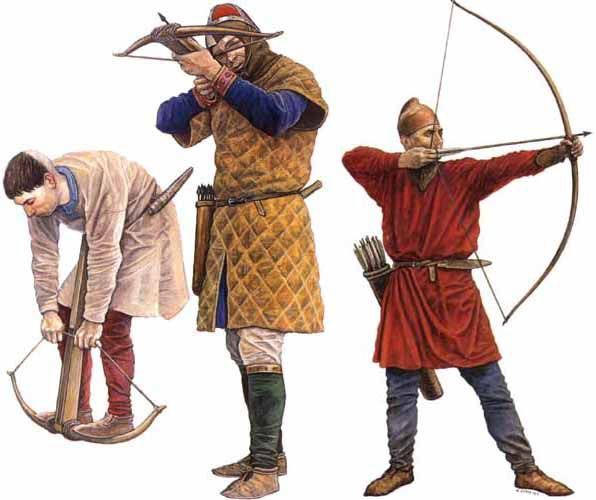
Given his privileged surroundings, Francis gained great skill as an archer, wrestler, and horseback rider. Although his father expected him to succeed him in the family’s textile business, Francis dreamed of becoming a knight. He wanted to become a hero to many, which is why he so conscientiously honed his skills as an archer and rider.
In 1202 when war broke out between Assisi and Perugia, Francis spotted his chance and took his place in the cavalry.
During a battle, Francis was captured and (because his family was wealthy) imprisoned for ransom instead of killed. It took his father nearly a year to gather the required sum to have him released.
While languishing in prison, Francis began to have visions from the divine and, after he was released, he could hear the voice of Christ, who told him to redeem the church and live a life of poverty. He threw off the trappings of wealth and became devoted to his new calling. (Later in life, Francis received an additional vision that left him with the stigmata of the Christ, making him the first person to ever receive those marks.)

During his lifetime, Francis developed an abiding love for nature and animals. During his Feast Day in October every year, millions of animals receive official blessing in the Blessing of the Animals.
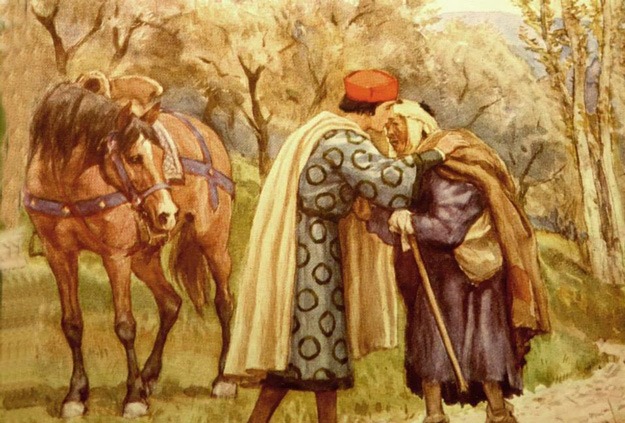
Also, during his lifetime, because of visions he said he had or actions he took which were counter to the sensibilities of his times (one example was his kissing of a leper, whom he said was Christ in disguise), some regarded Francis as a madman or a fool, while others considered him as close to Christ-like as they had ever encountered. Owing to his natural charm and unusual beliefs, he quickly became well-known.
One incident that separated him from his father forever was the time he sold a bolt of cloth from his father’s shop and his father’s horse (without daddy-O’s permission) to raise money to rebuild a church. His father took him to the local bishop and reported the theft. The bishop told Francis to return his father’s money. He did so, but while complying with the demand, Francis stripped off his clothes, standing there naked and declaring that God was the only father he would thenceforth recognize.
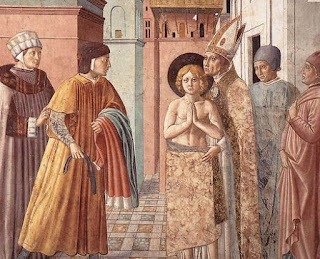
The bishop gave Francis a rough tunic to cover his nakedness, and thusly dressed, the young man left Assisi. Fallen upon immediately by a group of thieves, he was badly beaten, but he took it all in stride, feeling elated that he was finally fully freed from expectations not his own.
Poor Man, Rich Church
Francis’s radical embrace of poverty wasn’t mainstream at the time (any more than it is today in the mainstream of religion or society). The church itself was enormously rich, as were the people at its helm. This wealth didn’t sit well with Francis; he felt it diverged from the original ideals Christ had decreed. So, he went on a personal crusade to change this, visiting up to five villages every day. His charisma and the purity of his message drew thousands of adherents into his orbit. These became the very first Franciscan friars. (He even preached to animals, which earned him the title “God’s fool.”)
By the time he died on October 3, 1226, at 44 years of age, many predicted he would be canonized as a saint. As his health deteriorated, he returned to Assisi to die. Knights were sent from Assisi to guard him and guide him safely home ,since, at the time, the body of a saint was viewed as a valuable relic that would bring glory in whichever town it rested. He was canonized as a saint on July 16, 1228, and in 2013, nearly 800 years later, Cardinal Jorge Mario Bergoglio honored Saint Francis by taking his name and becoming Pope Francis, the current Pope of the Catholic Church.
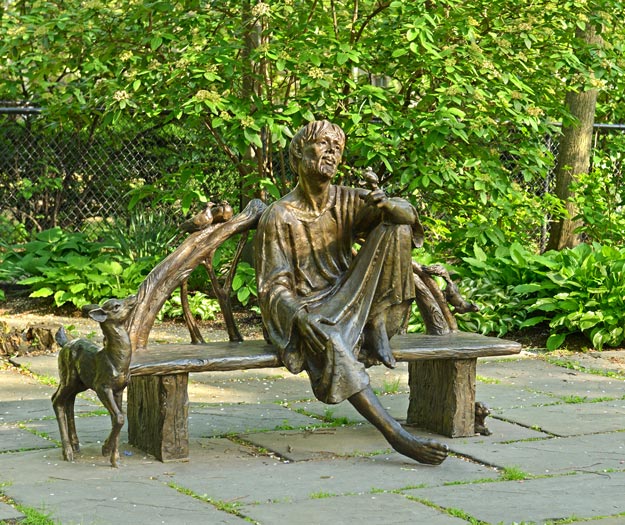
Most of us who adore animals and nature have always felt an affinity for Francis, whatever our feelings may be about religion. You can easily find concrete images of Saint Francis and many of love animals or the environment has a plaque, a statue, or some other item that reveals our fond feelings for him.
St Francis seems to have intuited the same kind of perspective on animals that a great many indigenous cultures have when it comes to how to view, regard, and treat them.
T o many Native Americans and First Nations indigenous people, animals are of great spiritual significance. Each of their Seven Sacred Teachings honors one of the animal virtues required for a full and healthy existence, so each law is signified by an animal to underpin the fact that all actions and decisions that we humans make impact other beings’ lives, not just our own.
Given their interconnected relationship with animals, Indigenous Peoples respected the natural lifecycles of the animals they shared the Earth with. They hunted, fished, and collected only what they absolutely needed to sustain their families, tribes, or clans. There was no such thing as ridiculous as” sport hunting” because animals were considered sacred and off-limits to unnecessary pursuits that result in harassment or death. And every part of the animal that was taken was used for crucial, life-sustaining purposes.
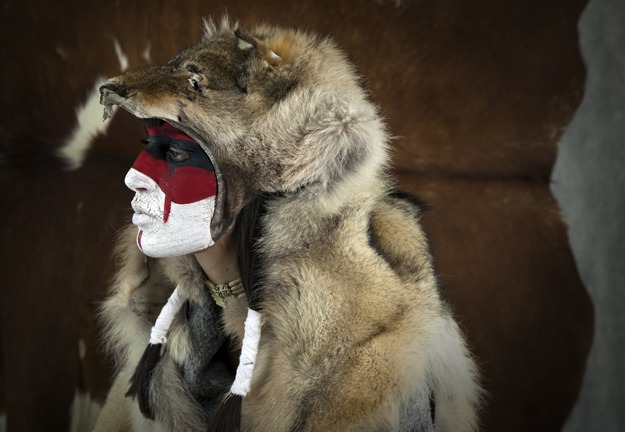
In fact, many cultures created celebrations and rituals of appreciation to honor the spirits of the animals taken for sustenance. As a result, although there were literally hundreds of tribes and as many as 112 million natives across what we now call The United States when Europeans first landed in 1492, there was no stock or species depletion due to over-utilization of the natural resources around them.
When meditating on Francis and his continuing influence, especially in the field of environmental science and animal welfare, I found it helpful to run a search on prayers and quotes that underscore the crucial importance of respecting life in all its forms. Running just a cursory search on “St Francis on animals and/or the environment” I found two short pieces that I want to share with you:
Here’s the first:
Good St. Francis, to you all God’s creatures were your brothers and sisters. Help us to follow your example by treating every living thing with kindness. Spirit of Love, grant us the wisdom to care for the earth. Help us to act now for the good of future generations and all your creatures. Help us to become instruments of a new creation, Founded on the covenant of your love.
And here’s the second – something to tie up this conversation with a bow. (If you’ve heard this one before, please indulge me for the pleasure and insight that others who haven’t heard it may glean from it.)
An old Cherokee is teaching his grandson about life. “A fight is going on inside me,” he said to the boy.
“It is a terrible fight, and it is between two wolves. One wolf is evil – he is filled with anger, envy, sorrow, regret, greed, arrogance, self-pity, guilt, resentment, inferiority, lies, false pride, superiority, and ego.” The old Cherokee continued, “The other wolf is good – he is filled with joy, peace, love, hope, serenity, humility, kindness, benevolence, empathy, generosity, truth, compassion, and faith. The same fight is going on inside you – and inside every other person, too.”
The grandson thought about it for a minute and then asked his grandfather, “Which wolf will win?”
The old Cherokee replied, “The one you feed.”
If you feel a connection to animals the way St. Francis did – as many of us do – and would like to deepen that connection and your ability to communicate with and heal the pets and animals in your life, consider joining our Communicating with Pets & Animals course.

